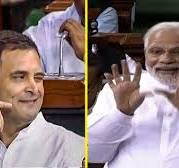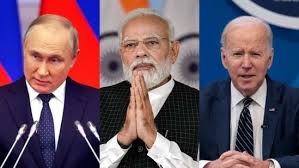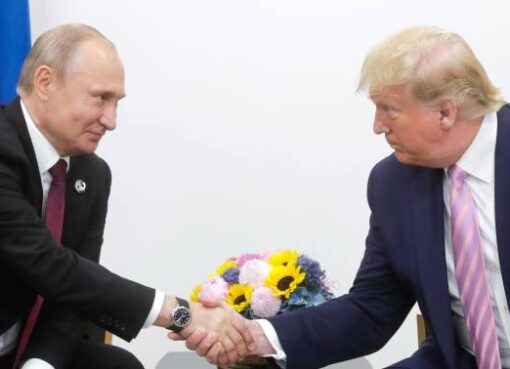There are signs of a very considered strategy from American side to pull Russia and Iran out of the prospect of any alliance with China, thus isolating it further
by Ankineedu Prasad Nallapati*
President Donald Trump’s MAGA-brand of `coercive and noisy’ ultimatums appear to be giving way to a more `mature and quiet’ diplomacy in pursuance of his foreign and international trade polices.
He pressed a pause on his aggressive reciprocal tariffs on imported goods from across the world, barring China, that had caused a `bloodbath’ in global economic order creating a panic even among Americans.
Retaliatory measures from some of US’ top trading partners, China and the EU in particular, may have also weighed in as the latter two have begun realigning their broader relationship that could have proven to be a strategic challenge to the American administration.
Isolating China and impeding its ability to challenge American supremacy are the openly stated goals of the Trump administration. Its tilt toward Russia partly explains the strategy in that direction.
Stable West Asia Is `Essential Cog’ In That Plan
A more stable West Asia, with special focus on Iran, is also an `essential cog’ in the overall strategy that will free the US to turn its unrestricted attention to Beijing.
Saudi Arabia and other Gulf allies are persuaded to lift `cuts’ in crude oil production, thus increasing supply and bringing down price which have direct impact on revenues of Russia and Iran. Additional sanctions are imposed on Iranian oil and shipping targets to curtail supplies to China.
The ground has also been prepared, crippling Iran’s `axis’ of resistance, to force its clerical leadership to negotiation table. While Israel has already disabled the Hamas and Hezbollah, the US has been disarming the Houthis in Yemen and Shia armed groups in Iraq.
Iran Joins Negotiations With US
Iran has landed itself in a situation where it is no more tenable to refuse negotiations with what it has always considered a “Great Satan”.
Trump’s 2-month ultimatum to Tehran, to negotiate a deal on its nuclear programme or face a military action that it had never seen before, came with a sugar-coated offer of business contracts leading to American investments in the Islamic Republic and easing of sanctions.
To prove that it is not an empty threat, he has amassed additional heavy military arsenal in the region, including two aircraft carriers, F 35 fighters, B2 bombers, etc.,
Russia has also been playing a helpful hand with its veteran intelligence chief Col Gen Sergei Beseda, and US Special Envoy Steve Witkoff closely coordinating bilateral relations as well as negotiations relating to Ukraine and Iran.
Witkoff travelled to St. Petersburg to meet President Putin and Beseda on April 11, ahead of talks with Iran in Muscat, mediated by Oman’s Foreign Minister.
Though Iran was not yet fully ready for direct negotiations, its Foreign Minister Abbas Araghchi, who led Iranian delegation, had a brief face-to-face meeting with Witkoff as desired by the US.
After the talks on April 12, he said, “…we came very close to a basis for negotiation…Neither we nor the other party want fruitless negotiations.”
A White House statement also said, “The discussions were very positive and constructive…Witkoff’s direct communication was a step forward in achieving a mutually beneficial outcome.” The Oman meeting is more to “set the parameters” for future talks, as stated by Witkoff.
The talks are to resume on April 19. Iranian officials are hinting that they are open to greater restrictions on uranium enrichment and more transparency for international inspections.
In return, they want relief from sanctions. This may not be enough for the American side, who wants more comprehensive curbs on its missile development as well to end any threat to Israel.
While the `negotiating process’ may take longer time, it is expected that Iran would meanwhile `calm down’ its military proxies like the Houthis and also cut down its trading relations with China, including unauthorized oil supplies. Iran will inturn gets relief from any military attack from the American or Israeli side.
Time only will tell whether the two sides are genuinely want to move toward a more productive relationship or just positioning themselves for a better leverage at a future scenario.
Iranian President Masoud Pezeshkian, however, seems to be hopeful as he is welcoming the prospects of US investments in his country. The hardliners are not so hopeful, though.
The Outlook
Whatever the outcome of the US-Iran negotiation process, there appears to be a very considered strategy from the American side to pull Russia and Iran out of the prospect of any alliance with China, thus isolating it further.
The US also seems to be gaining traction in peeling off some of China’s important allies in Central American and South Caucuses. More will come on this later.
Meanwhile, singling China out for `abnormal’ tariff war, hence, may not be a hackneyed action. Whether the US can endure for long the resulting economic pain will be a question mark.
(*Ankineedu Prasad Nallapati is President of the Hyderabad-based think-tank, “Deccan Council for Strategic Initiatives” and former Additional Secretary to the Govt of India.)




